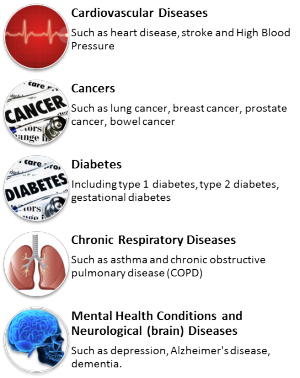LENScience
What are Non-Communicable Diseases?
Non-communicable diseases (NCDs) are a group of diseases with long durations and generally slow progression. NCDs cannot be passed from one person to another. They are caused by a combination of genetic factors (probably less than 3%) and environmental exposures throughout life (even before we are born).
NCDs include four major groups: cardiovascular diseases, non-hereditary cancers, chronic respiratory diseases, and diabetes. A fifth group, mental health and neurological conditions is also very important.
While NCDs cause the majority of deaths worldwide (63%) their impact is most significant in low and middle-income countries and communities in high-income countries that are least resourced. In these communities NCDs occur earlier in life, and have a greater impact on quality of life, the ability to earn an income, support a family, and nurture the next generations.
Avoidable and unjust health inequities driven by lack of access to good nutrition, time and opportunities for physical activity, education, employment and secure housing drive this difference between the impact of NCDs in rich and poor communities.

Recommended Reading for Teachers
Bay JL, Mora HA. Te Maki Toto Vene (T2): E Mananamanta no Tuku Iti Tangata [Exploring Type 2 Diabetes: A socio-scientific issue for my community] Teacher Resource Cook Islands Edition. 2016. Read Pacific Publishers. New Zealand - Chapter 3
World Health Organization, NCD Fact Sheet
